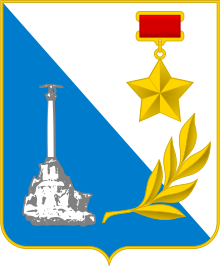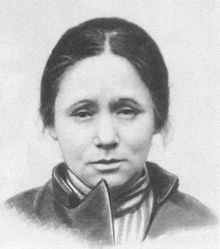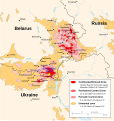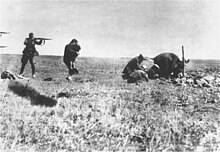Portal:Ukraine
The Ukraine Portal - Портал України
Ukraine Україна (Ukrainian) | |
|---|---|
| ISO 3166 code | UA |
Ukraine is a country in Eastern Europe. It is the second-largest European country after Russia, which borders it to the east and northeast. Ukraine also borders Belarus to the north; Poland and Slovakia to the west; Hungary, Romania and Moldova to the southwest; and the Black Sea and the Sea of Azov to the south and southeast. Kyiv is the nation's capital and largest city, followed by Kharkiv, Dnipro, and Odesa. Ukraine's official language is Ukrainian.
Humans have inhabited Ukraine since 32,000 BC. During the Middle Ages, it was the site of early Slavic expansion and later became a key centre of East Slavic culture under the state of Kievan Rus', which emerged in the 9th century. Kievan Rus' became the largest and most powerful realm in Europe in the 10th and 11th centuries, but gradually disintegrated into rival regional powers before being destroyed by the Mongols in the 13th century. The area was then contested, divided, and ruled by a variety of external powers for the next 600 years, including the Polish–Lithuanian Commonwealth, the Austrian Empire, the Ottoman Empire, and the Tsardom of Russia.
The Cossack Hetmanate emerged in central Ukraine in the 17th century but was partitioned between Russia and Poland before being absorbed by the Russian Empire in the late 19th century. Ukrainian nationalism developed and, following the Russian Revolution in 1917, the short-lived Ukrainian People's Republic was formed. The Bolsheviks consolidated control over much of the former empire and established the Ukrainian Soviet Socialist Republic, which became a constituent republic of the Soviet Union in 1922. In the early 1930s, millions of Ukrainians died in the Holodomor, a human-made famine. During World War II, Ukraine was occupied by Germany and endured major battles and atrocities, resulting in 7 million civilians killed, including most Ukrainian Jews.
Ukraine gained independence in 1991 as the Soviet Union dissolved and declared itself neutral. A new constitution was adopted in 1996 as the country transitioned to a free market liberal democracy amid endemic corruption and a legacy of state control. The Orange Revolution of 2004–2005 ushered electoral and constitutional reforms. Resurgent political crises prompted a series of mass demonstrations in 2014 known as the Euromaidan, leading to a revolution, at the end of which Russia unilaterally occupied and annexed Ukraine's Crimean Peninsula, and pro-Russian unrest culminated in a war in Donbas with Russian-backed separatists and Russia. Russia launched a full-scale invasion of Ukraine in 2022. (Full article...)
In the news
- 20 January 2025 – Russian invasion of Ukraine
- Attacks in Russia during the Russian invasion of Ukraine
- Ukrainian drones attack industrial facilities in Tatarstan, Russia, prompting the Russian Federal Air Transport Agency to temporarily suspend flights at Kazan International Airport in Kazan and Begishevo Airport in Nizhnekamsk. (ABC News)
- 18 January 2025 – Russian invasion of Ukraine
- Kryvyi Rih strikes
- Four people are killed and 14 others are injured in a Russian ballistic missile strike on Kryvyi Rih, Ukraine, according to the Governor of Dnipropetrovsk Oblast Serhiy Lysak. (Euronews)
- Russian strikes against Ukrainian infrastructure
- At least four people are killed in Russian missile and drone attacks on Kyiv, Ukraine. (Al Jazeera)
- 16 January 2025 – Ukraine–United Kingdom relations
- British Prime Minister Keir Starmer visits Kyiv, Ukraine, to sign a 100-year agreement with Ukraine that will formalize British economic and military support for Ukraine. (Sky News) (BBC News)
- 15 January 2025 – Russian invasion of Ukraine
- Russian strikes against Ukrainian infrastructure
- Russia launches a major ballistic and cruise missile attack on regions across Ukraine, targeting energy production and compelling authorities to shut down the power grid. (AP)
- 14 January 2025 – Russian invasion of Ukraine
- Attacks in Russia during the Russian invasion of Ukraine
Featured pictures
Did you know (auto-generated)

- ... that during a German charity concert for Ukraine, Slovakian singer Judita Nagyová performed a solo in the finale of Beethoven's Ninth Symphony?
- ... that military volunteer Maria Berlinska led the report that let women hold combat positions in the Ukrainian military?
- ... that Oksana Lyniv founded the Youth Symphony Orchestra of Ukraine in 2016 and conducted them in thirty concerts across ten music festivals in 2022?
- ... that after the Russian invasion, the daughter of the Ukrainian ambassador to Indonesia was evacuated together with Indonesian citizens in Ukraine?
- ... that Hanna Dmyterko was among 34 Ukrainian women who fought in World War I?
- ... that Sarah Ashton-Cirillo, covering the Russian invasion of Ukraine, said that Ukrainians care less about her being transgender than Americans do?
More did you know -
- ... that Ukrainian composer Mykola Leontovych (pictured), known for the "Carol of the Bells", was nicknamed "Ukrainian Bach" in France?
- ... that Ukrainian naturalist, lecturer, artist and author John Lhotsky was credited as the first discoverer of gold in New South Wales?
- ... that although the secular music of Mykola Leontovych was well known in the twentieth century, the Liturgy of St. John Chrysostom was little known because of a ban on sacred music in the Soviet Union?
- ... that the Privat Group is one of the few Ukrainian companies that own industries in the United States?
- ... that journalist Savik Shuster who used to work for Russian TV channels now prefers to work for the Ukrainian TV because he felt the Russian Government was limiting his journalistic freedom?
- ... that according to legend, a tunnel leads from the Kamianets-Podilskyi Castle to the Khotyn Fortress which is 20 kilometres (12 mi) away?
Selected article -
The Holocaust in Ukraine was the systematic mass murder of Jews in the Reichskommissariat Ukraine, the General Government, the Crimean General Government and some areas which were located to the East of Reichskommissariat Ukraine (all of those areas were under the military control of Nazi Germany), in the Transnistria Governorate and Bessarabia, Northern Bukovina and the Hertsa region (all of those areas were then part of Romania, with the latter three areas being re-annexed) and Carpathian Ruthenia (then part of Hungary) during World War II. The listed areas are currently parts of Ukraine (except modern-day Transnistria).
Between 1941 and 1945, between 850,000 and 1,600,000 Jews were killed in Ukraine, which included assistance of local collaborators. (Full article...)
In the news
- 20 January 2025 – Russian invasion of Ukraine
- Attacks in Russia during the Russian invasion of Ukraine
- Ukrainian drones attack industrial facilities in Tatarstan, Russia, prompting the Russian Federal Air Transport Agency to temporarily suspend flights at Kazan International Airport in Kazan and Begishevo Airport in Nizhnekamsk. (ABC News)
- 18 January 2025 – Russian invasion of Ukraine
- Kryvyi Rih strikes
- Four people are killed and 14 others are injured in a Russian ballistic missile strike on Kryvyi Rih, Ukraine, according to the Governor of Dnipropetrovsk Oblast Serhiy Lysak. (Euronews)
- Russian strikes against Ukrainian infrastructure
- At least four people are killed in Russian missile and drone attacks on Kyiv, Ukraine. (Al Jazeera)
- 16 January 2025 – Ukraine–United Kingdom relations
- British Prime Minister Keir Starmer visits Kyiv, Ukraine, to sign a 100-year agreement with Ukraine that will formalize British economic and military support for Ukraine. (Sky News) (BBC News)
- 15 January 2025 – Russian invasion of Ukraine
- Russian strikes against Ukrainian infrastructure
- Russia launches a major ballistic and cruise missile attack on regions across Ukraine, targeting energy production and compelling authorities to shut down the power grid. (AP)
- 14 January 2025 – Russian invasion of Ukraine
- Attacks in Russia during the Russian invasion of Ukraine
Selected anniversaries for January

- January 3, 1681 — Treaty of Bakhchisarai was signed by Russia, the Ottoman Empire, and the Crimean Khanate at the conclusion of the Russo-Turkish War (1676–1681).
- January 10, 1992 — the Ukrainian karbovanets replaced the Soviet ruble at par, with the ISO 4217 code being
UAK. - January 15, 1967 — David Burliuk, an avant-garde artist, died in Long Island, New York.
- January 22, 1919 — The Act Zluky was signed, unifying the Ukrainian People's Republic and the West Ukrainian National Republic.
- January 23, 2005 — Ukrainian president Viktor Yushchenko was inaugurated into office after winning the second run-off elections in late 2004.
- January 29, 1918 — Battle of Kruty takes place between the Ukrainian People's Republic and Bolshevik forces.
Photo gallery
Related portals
Religions in Ukraine
Post Soviet states
Other countries
WikiProjects and collaborations
Associated Wikimedia
The following Wikimedia Foundation sister projects provide more on this subject:
-
Commons
Free media repository -
Wikibooks
Free textbooks and manuals -
Wikidata
Free knowledge base -
Wikinews
Free-content news -
Wikiquote
Collection of quotations -
Wikisource
Free-content library -
Wikiversity
Free learning tools -
Wikivoyage
Free travel guide -
Wiktionary
Dictionary and thesaurus
New articles
Ukrainian editions of Wikimedia projects



![Image 1 Khrushchev in 1962 Nikita Sergeyevich Khrushchev (15 April [O.S. 3 April] 1894 – 11 September 1971) was First Secretary of the Communist Party of the Soviet Union from 1953 to 1964, and Chairman of the Council of Ministers (premier) from 1958 to 1964. During his rule, Khrushchev stunned the communist world with his denunciation of his predecessor Joseph Stalin and embarked on a policy of de-Stalinization with his key ally Anastas Mikoyan. He sponsored the early Soviet space program and enacted reforms in domestic policy. After some false starts, and a narrowly avoided nuclear war over Cuba, he conducted successful negotiations with the United States to reduce Cold War tensions. In 1964, the Kremlin circle stripped him of power, replacing him with Leonid Brezhnev as First Secretary and Alexei Kosygin as Premier. Khrushchev was born in 1894 in a village in western Russia. He was employed as a metal worker during his youth, and he was a political commissar during the Russian Civil War. Under the sponsorship of Lazar Kaganovich, Khrushchev worked his way up the Soviet hierarchy. He originally supported Stalin's purges and approved thousands of arrests. In 1938, Stalin sent him to govern the Ukrainian SSR, and he continued the purges there. During what was known as the Great Patriotic War, Khrushchev was again a commissar, serving as an intermediary between Stalin and his generals. Khrushchev was present at the defense of Stalingrad, a fact he took great pride in. After the war, he returned to Ukraine before being recalled to Moscow as one of Stalin's close advisers. (Full article...)](http://upload.wikimedia.org/wikipedia/en/d/d2/Blank.png)
































































